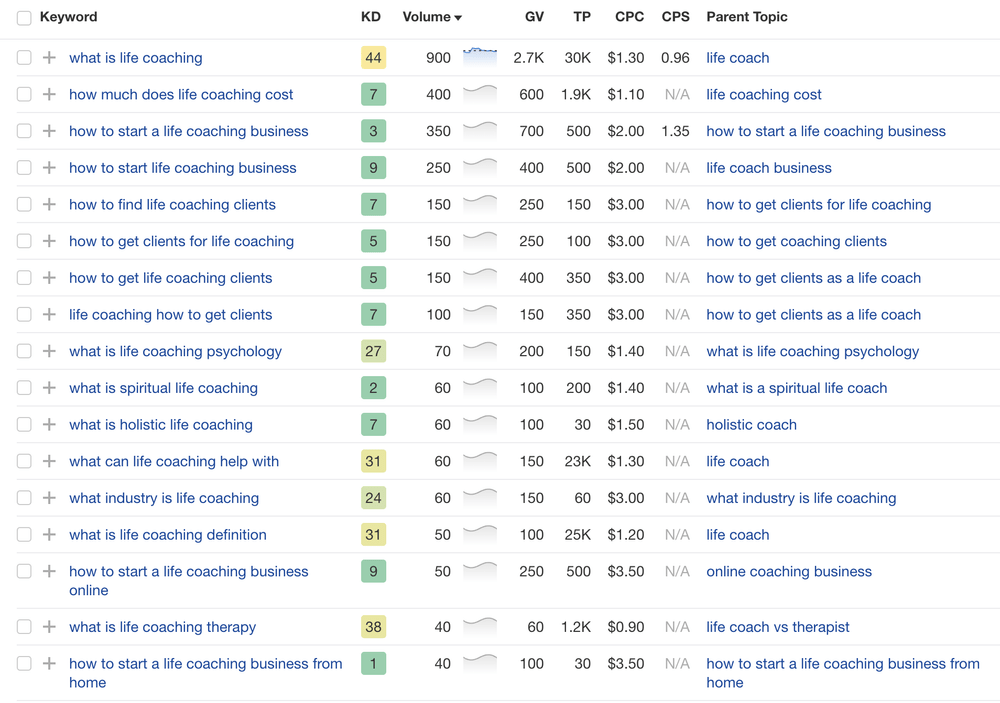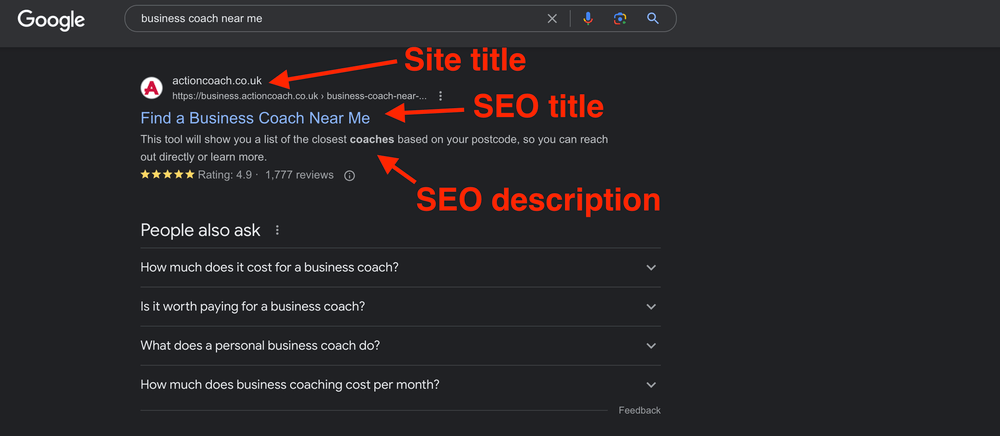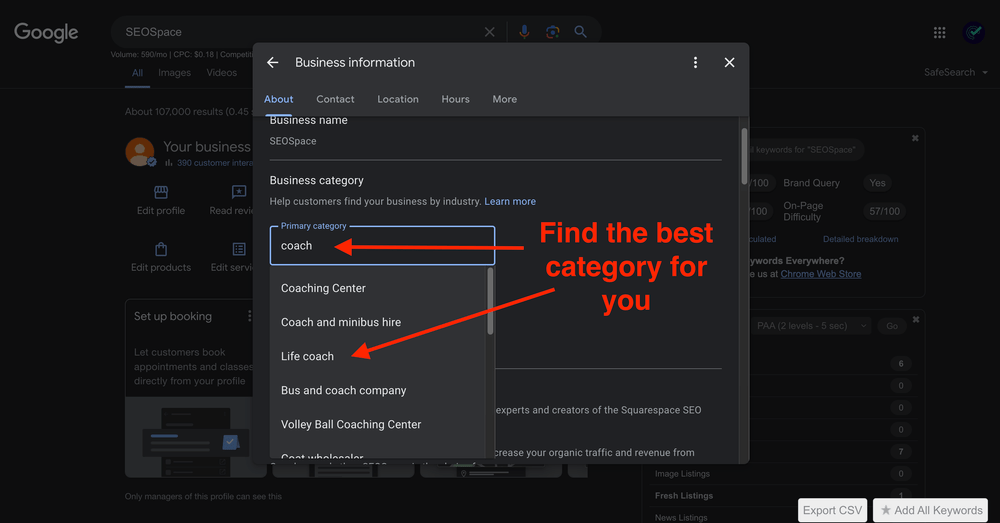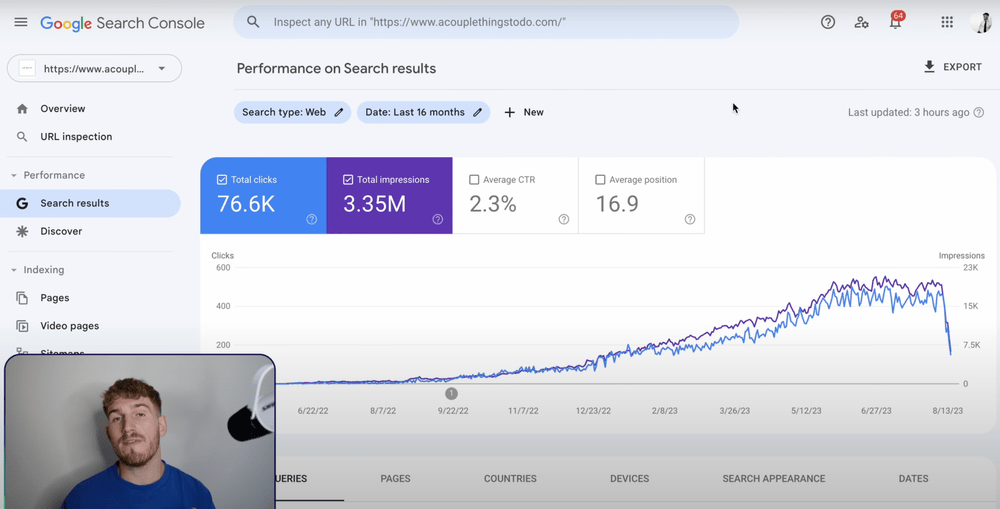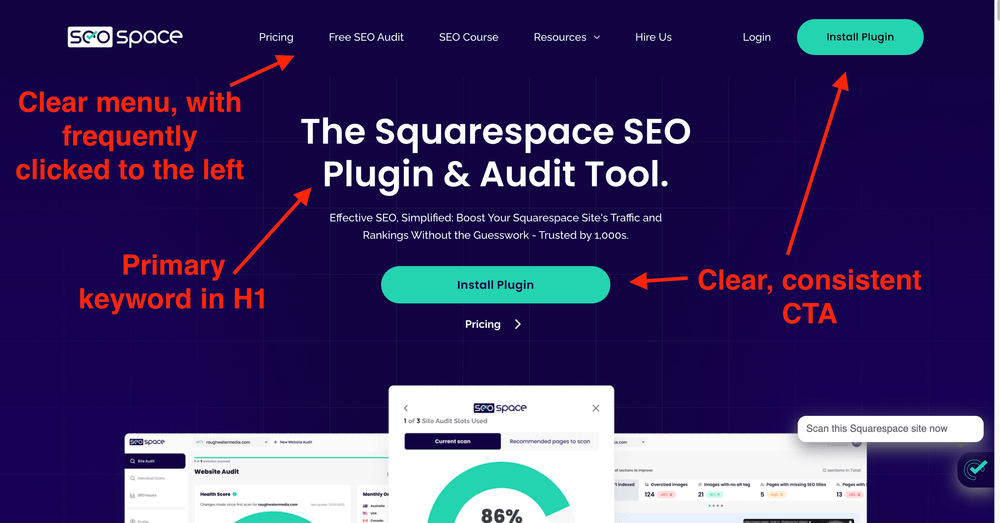SEO for Coaches: Complete Guide to Rank #1 in 2025
Are you a coach looking to build your business online and generate bookings to fill up your calendar? Do you have a coaching website but can’t seem to reach your target audience online? SEO for coaches can be the difference between your current situation and a coaching business owner enjoying increased revenue from organic website traffic.
But how exactly can SEO (search engine optimization) help? SEO comprises the various strategies that help get your website ranking higher in search engines like Google. With only 25% of Internet users making it past the first page, if you don’t get your SEO right, people who don’t know about your business won’t find you.
As experts in SEO with a leading Squarespace plugin used by thousands of businesses, we’re uniquely positioned to guide you in the journey of optimizing your coaching site. Read on as we break down the various steps you can take to improve your visibility and attract more clients through search.
What Is SEO for Coaches?
SEO, or search engine optimization, is a digital marketing strategy aimed at enhancing a website’s visibility in search engine results. As a coach, SEO is a powerful tool that can significantly increase your business’s online visibility, drive more organic traffic to your website, and, ultimately, attract more clients in need of your coaching services.
Why Coaches Need SEO
In today’s digital age, most people turn to search engines like Google when they’re looking for a coach. Similar to how businesses search for IT solutions, people might search for terms like “life coach near me” or “business coaching services.” If your website is well-optimized for these terms, including the key phrase "SEO for coaches," it’ll appear higher in the search engine results for these queries, making it more likely that potential clients will click on your site and consider your services for hire.
SEO for life coaches is not just about attracting more traffic; it’s about attracting the right traffic. A well-optimized website will attract visitors who are genuinely interested in what you offer. For instance, if you’re a life coach specializing in career transitions, SEO can help you attract individuals seeking guidance in that specific area. Moreover, adding newsletters help nurture clients — so learn how to build one to keep your audience engaged and turn interest into long-term relationships.
A 9-Step Guide to Perfecting SEO for Coaches
While it’s highly recommended to work with an SEO agency or follow an SEO course when trying to rank your website on the front page of Google, it’s equally advisable to learn the basics of optimizing your site for life-coaching keywords.
Follow these 9 steps to optimize your website for search engine visibility:
Conduct comprehensive keyword research.
Invest in competitor research.
Adopt on-page SEO best practices.
Set up and optimize your Google My Business profile.
Create compelling content/blog posts.
Connect Google Search Console and Google Analytics.
Build backlinks and citations.
Optimize user experience to improve conversion.
Develop a long-term SEO strategy.
Step 1. Conduct comprehensive keyword research.
Effective SEO starts with identifying the keywords your target clients are searching for. These are the words and phrases that users search for online when looking to hire your services. Keywords for coaching will likely be terms like “life coaching,” “career coaching,” or “executive coaching,” as well as long-tail keywords like “career coach for young professionals.”
Use keyword research tools like Ahrefs and Keywords Everywhere to uncover:
High search volume keywords related to your services. These can include keywords with search volumes of about 100 searches per month or more. These will drive a lot of relevant traffic.
Long-tail variations like “best professional development coaching.” or “success coach for small businesses.” These tend to convert better since they have higher buyer intent.
Location-based keywords like “Dallas executive coach” if you offer local services.
Below are a list of SEO keywords for coaches that will help provide some inspiration for your keyword research efforts.
Also, aim to include related FAQs in your website content to address common queries that your target audience may have. This strategy is a great way to appear in Google’s featured snippets section, increasing your website’s visibility and your chances of securing inbound leads that lead to bookings. A few examples are shown below.
As you build out a services page for each offering, identify 1 primary SEO keyword and a few secondary keywords to optimize that page around. Then, create related blog posts targeting 5–10 secondary keywords related to each service.
This intentional keyword targeting will tell search engines exactly what each web page focuses on. Over time, if you publish helpful, thorough content, you’ll start ranking for these terms and attract ideal prospective clients.
Step 2. Invest in competitor research.
Analyzing your competitors’ strategies will give you ideas for improving your site.
Here is a checklist of what to do when analyzing competitors:
Study the keywords they are ranking for: Search for relevant terms like “life coach” and see what sites show up on page one.
Look at their on-page optimization: Check their titles, URLs, headers, content, etc. How are they optimizing these elements?
Examine their backlink profile: Where do their backlinks come from, and how healthy are they? What anchor text are they using?
Study their site architecture: How is their site structured? How many pages do they have targeting various topics?
Learn about their social media presence: Are they actively posting content and engaging their audience?
As you uncover what’s working for others in your niche, you can model what applies to your coaching business. You don’t have to copy them outright; rather, use them as inspiration.
Pro Tip: Check out your competitors in Ahrefs, SEMrush, or Moz to analyze their keywords and backlinks. These tools provide valuable intel!
Learning from intuitive coaching sites that are already ranking well gives you an SEO blueprint to work with. With smart competitor research, you’ll gain lots of ideas for ranking your coaching site higher on search engines and outranking competitors!
Step 3. Adopt on-page SEO best practices.
To perfect SEO for coaches, it’s important to look into on-page elements, which you, interestingly, have more control over. Let’s go over some key on-page optimization best practices to help coaches rank higher.
Optimize page titles: Include your target keyword in your H1 and title tag. Keep it between 50 and 60 characters in length.
Enhance SEO descriptions: Thoroughly fill your website and blog page meta description while using related keywords. Ensure they’re between 150 and 160 characters for best results.
Strategic keyword placement: Naturally introduce your target terms into the first and last paragraphs of content. Use them in headers, image alt text, and other strategic parts of a webpage’s content.
Improve site architecture: Use descriptive page names with keywords. Have a simple information architecture (IA) and link to other helpful resources on your website (internal links).
Optimize images: Properly name image files while introducing your target keywords where possible. Provide alt text and ensure images don’t have large sizes for fast page load times — Squarespace users are recommended to stick to a maximum size of 250 kb.
A proper on-page SEO optimization leads to sustainable ranks and traffic. Optimizing your website for local search is also key — which leads us to step #4.
Step 4. Set up and optimize your Google My Business profile.
As a coach, having an accurate and complete Google My Business (GMB) profile is crucial for gaining visibility in local search results. This will help potential coaching clients find and learn about your services when they search for coaches in your area.
Here are some tips to help optimize your GMB profile:
Categorize your business properly: For most coaches, you’ll want to categorize your business under “Professional Services >>> Life Coach” or a more specific coaching niche like “Career Coach” or “Health Coach.” Correct categorization helps Google understand your services and recommend them to the right audience.
Flesh out your business info: Provide your full business name, correct address, phone number, website URL, hours of operation, etc. The more complete your listing, the more it establishes you as a legitimate local business.
Write useful business descriptions: Briefly explain what you do, your areas of coaching expertise, who you work with, what makes your coaching approach unique, and what results clients can expect. This gives visitors key details upfront.
Add high-quality photos: Include both interior and exterior shots of your office, as well as professional headshots of yourself and your brand logo. This puts a face to the business and builds familiarity.
Link to your website and booking page: Add URLs wherever possible, both for credibility and to facilitate easy booking of your coaching services.
Encourage client reviews: Google favors listings with ample positive reviews. Politely ask satisfied clients to review your business on Google after coaching sessions. If you offer in-person coaching services, we recommend printing a QR code that links to your reviews page; you can hand this out to clients after each appointment. This social proof can give you an edge over the competition in local rankings.
Properly optimizing your Google My Business profile with keywords for life coaching is a foundational step every life coach should take. Not only can it bring in more organic traffic and visibility in Google Maps and Search, but it also feeds data into the Google Knowledge Panel that appears prominently beside many related queries. Put your best face forward for local clients!
Step 5. Create compelling content/blog posts.
Curating valuable blog content is one of the most important SEO ranking factors for coaches. Think of your blog post as a “magnet” that you use to attract Internet users interested in anything related to your coaching business. They may not sign up immediately, but if they see you as an expert in your coaching niche, they will be more likely to hire your coaching services in the future.
The goal is to create content that searchers will not only click on from Google but also spend time reading. To achieve this, you need to publish only helpful and valuable content.
Here are 3 strategies to adopt when creating content or blogs for your coaching website:
a. Provide in-depth value on coaching topics.
Cover your topics extensively, diving deeper than your competitors. Don’t just briefly summarize; provide step-by-step how-to’s, detailed explanations, examples, statistics, images/graphics, videos, related resources, etc. Demonstrate your knowledge while educating readers.
Aim for long-form content based on what competitors are doing, but better and longer. Data shows pages of around 2,500 words tend to outperform shorter posts for organic search visibility and traffic. Of course, quality trumps quantity, but strive for both.
b. Optimize each post.
Incorporate your primary and secondary keywords naturally throughout each post in headings, subheadings, body content, image names/alt text, etc.
Include related long-tail keyword phrases and questions searchers may ask. Try to answer their questions better than anyone else. One major strategy we adopt at SEOSpace is to write responses similar (but better) to the snippet that pops up whenever the question is searched on Google.
c. Engage readers.
Address pain points your audience has. Provide solutions, coaching advice, and actionable takeaways.
Format content in easily scannable sections with bullet points and numbered lists when applicable.
Insert relevant images, charts, videos, and quotes to reinforce key points and keep readers engaged.
The more insightful and useful your posts, the more organic search visibility you’ll gain over time.
Step 6. Connect Google Search Console and Google Analytics
Connecting Google Search Console (GSC) and Google Analytics (GA) will allow you to see how people find your coaching website and which pages get the most traffic. This information can help you identify opportunities to optimize your SEO and earn more clients.
Here are the key things to do when connecting these tools:
Connect your website to GSC — it’s free! This allows you to check indexing issues, submit a sitemap for faster indexing, and see search queries people use to find your site.
Install the GA tracking code on all pages of your website. This lets you see all website traffic data, like visitors, top pages, and conversion events.
Connect your GA and GSC accounts. This connects the data so you can see which search queries resulted in website visits and goals like contact form submissions.
Set up email reports in GA to have traffic reports automatically sent to your inbox. Review frequently to spot trends and issues.
Check if your most important pages like “About,” “Services,” and top blog posts appear correctly in GSC and have been indexed by Google. If not, submit them for indexing.
By connecting your GSC and GA accounts, you gain powerful insights into how people find and interact with your website. Review reports regularly to guide your SEO efforts, fix indexing issues quickly, and better understand visitor behavior. Ultimately, this will help you rank higher in search and convert more ideal clients!
Step 7. Build backlinks and citations.
Backlinks and citations from other high-quality websites are crucial when doing SEO for coaches. Backlinks are links from other websites that direct visitors to your website — they help build your website’s domain authority, an important SEO ranking factor. On the other hand, citations are mentions of your business's name, address, and phone number on other websites, and one tool for securing citations is BrightLocal.
Here are some tips to help you secure quality backlinks to your coaching website:
Offer unique insights: Share your perspectives and experiences through blog posts, videos, podcasts, and other content. If the content provides value, other sites will naturally link to it.
Prioritize long-tail keywords: Target less competitive coaching keywords so your content can rank more easily. High-ranking content means bloggers and journalists can easily discover and cite your material.
Guest post strategically: Approach websites where a guest post would interest their audience. Ensure to avoid poor-quality or spammy sites.
Leverage existing relationships: Ask associates, partners, or clients if they’d be open to linking to relevant content you’ve created from their website.
Build citations: Register your coaching business on directories and review sites to help search engines validate your coaching business info.
Backlinks indicate not just popularity but also trust and authority. The key is to earn links through creating genuinely useful content and building connections, not using shady tactics. This proven strategy has helped our website get featured on Forbes.
Our expert SEO team can help coaches like you implement an ethical, sustainable link-building plan tailored for long-term SEO success.
Step 8. Optimize user experience to improve conversion.
Your website’s user experience (UX) has a direct impact on your conversion rate. If visitors find your site’s content easy to understand or don’t enjoy seamless navigation, they may bounce without taking any action. Optimizing your UX makes it easier for website visitors to access information on your website, understand your coaching services, and ultimately convert into leads or clients.
The image shows SEOSpace's website as an example of great user experience.
Here are valuable tips to consider when optimizing your coaching website’s UX:
Focus on readability: Use short paragraphs, bullet points, and ample white space. Avoid walls of text; make your content scannable and easy to digest. You can also break up long posts with subheadings.
Highlight calls-to-action: Use contrasting colors and prominent placement to draw attention to your CTAs, like booking buttons, contact forms, etc. Ensure they are visible both on desktop and mobile.
Simplify navigation: Organize site pages and blog posts under descriptive yet concise menus and categories. Include search bars and site maps to aid discovery.
Mobile optimization: Currently, 92.3% of Internet users access the web via a mobile phone. It’s important to cater to this category of users by ensuring pages load quickly on mobile and using responsive design so layouts adjust seamlessly across devices.
By making your coaching website easier and more enjoyable to use, visitors are more likely to stick around, explore more pages, and ultimately convert into happy clients for your coaching business.
Step 9. Develop a long-term SEO strategy.
Building a long-term strategy is key for life coaches who want to rank higher and reach more clients over time. Rather than quick fixes, you need an ongoing SEO plan to steadily improve your site’s authority and visibility with life-coaching keywords.
Follow these tips when curating an SEO strategy for the long term:
First, revisit your goals. Do you want to rank #1 for your main service keywords? Get featured in knowledge panels? Or simply drive more traffic to your site? Setting clear objectives will inform your SEO strategy.
Next, break your SEO strategy down into manageable chunks using a checklist. Also, designate time each week to create SEO-friendly blog posts around secondary keywords. Regularly publishing content will fuel your organic growth.
Finally, continue to track your progress. Did that new pillar page increase clicks? Are people staying on-site longer? Monitoring the metrics keeps you accountable.
With our SEO plugin for Squarespace users and this long-term roadmap, coaches can execute an effective strategy to rank higher on search engines and attract more clients via organic traffic. All it takes is consistency!
Frequently Asked Questions
How do I start SEO for life coaches?
SEO for life coaches can feel daunting, but it’s manageable when broken down into steps as follows:
Start by finding relevant keywords that your target audience is searching for.
Next, naturally incorporate these keywords into your page title, URL, meta description, and H1 text.
Make sure your page’s content also reflects these keywords.
Building links to your website is another crucial step, as it enhances your site’s credibility.
Lastly, monitor your Google rank to assess your SEO strategy’s effectiveness and make necessary adjustments. Remember, SEO is a long-term game, so be patient and consistent.
Is SEO paid or free?
SEO, short for search engine optimization, focuses on improving organic or unpaid traffic to your website through higher search engine rankings. While SEO strategies require time and effort, they do not directly cost money like strategies for search engine marketing; coaches pay for Google Ads in SEM. So, in essence, while SEO isn’t entirely free, given the time investment, it doesn’t require a paid ad budget like SEM does.
How much should a beginner SEO cost?
The cost of beginner SEO services can vary greatly based on the complexity of the project and the reputation of the SEO agency. At SEOSpace, for example, our Peace of Mind SEO services start at $799 per month (for 3 months), while our Growth Co-Pilot SEO services cost $1,799 monthly (for 3 months). Alternatively, if you use Squarespace, you could opt for our SEO plugin; it has a free plan and premium packages starting at $14.99 monthly.
Is SEO hard to learn?
SEO, while not inherently hard to learn, can be overwhelming for beginners due to its multifaceted nature. It involves understanding multiple digital marketing strategies, akin to adding new tools to your toolkit. However, with persistence and patience, you can understand these elements over time.
The key is to break it down into manageable parts, starting with foundational concepts like keywords, meta tags, and backlinks, then gradually moving on to more complex strategies. So, while SEO might initially seem daunting, with consistent effort and continuous learning, it is a powerful weapon in your digital marketing arsenal.
Conclusion
Your path to increased bookings for coaching services begins with good SEO. By following the strategies outlined in this guide, you can exploit the large pool of clients searching for your services online. The SEOSpace team understands what businesses like yours need and can help boost your inbound leads with excellent SEO for coaches. Book a discovery call with us today to learn more about our SEO for coaches offerings.



